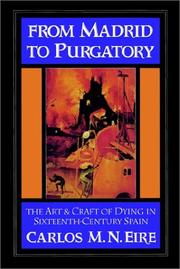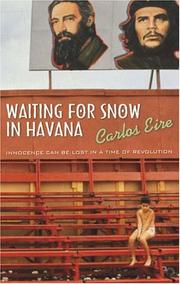| Listing 1 - 10 of 14 | << page >> |
Sort by
|
Book
ISBN: 9780300111927 9780300240030 0300111924 Year: 2016 Publisher: New Haven: Yale university press,
Abstract | Keywords | Export | Availability | Bookmark
 Loading...
Loading...Choose an application
- Reference Manager
- EndNote
- RefWorks (Direct export to RefWorks)
This fast-paced survey of Western civilization’s transition from the Middle Ages to modernity brings that tumultuous period vividly to life. Carlos Eire, popular professor and gifted writer, chronicles the two-hundred-year era of the Renaissance and Reformation with particular attention to issues that persist as concerns in the present day. Eire connects the Protestant and Catholic Reformations in new and profound ways, and he demonstrates convincingly that this crucial turning point in history not only affected people long gone, but continues to shape our world and define who we are today. The book focuses on the vast changes that took place in Western civilization between 1450 and 1650, from Gutenberg’s printing press and the subsequent revolution in the spread of ideas to the close of the Thirty Years’ War. Eire devotes equal attention to the various Protestant traditions and churches as well as to Catholicism, skepticism, and secularism, and he takes into account the expansion of European culture and religion into other lands, particularly the Americas and Asia. He also underscores how changes in religion transformed the Western secular world. A book created with students and nonspecialists in mind, Reformations is an inspiring, provocative volume for any reader who is curious about the role of ideas and beliefs in history.
Counter-Reformation --- Christian religion --- Reformation --- anno 1400-1499 --- anno 1600-1699 --- anno 1500-1599 --- Europe --- 284 --- 27 "14/16" --- 27 "14/16" Histoire de l'Eglise--?"14/16" --- 27 "14/16" Kerkgeschiedenis--?"14/16" --- Histoire de l'Eglise--?"14/16" --- Kerkgeschiedenis--?"14/16" --- 284 Protestantisme. Protestantse sekten --- 284 Protestantisme. Sectes protestantes --- Protestantisme. Protestantse sekten --- Protestantisme. Sectes protestantes --- Christian church history --- World history --- Christelijke godsdienst --- Christelijke kerkgeschiedenis --- Wereldgeschiedenis --- Reformatie --- Contrareformatie --- Europa --- Reformation. --- Counter-Reformation. --- Renaissance. --- Réforme protestante --- Église --- Contre-Réforme --- Réforme protestante --- Église --- Contre-Réforme

ISBN: 052130685X 0521379849 0511528833 0511870450 9780521306850 9780521379847 9780511528835 Year: 1989 Publisher: Cambridge: Cambridge university press,
Abstract | Keywords | Export | Availability | Bookmark
 Loading...
Loading...Choose an application
- Reference Manager
- EndNote
- RefWorks (Direct export to RefWorks)
In the second decade of the sixteenth century medieval piety suddenly began to be attacked in some places as 'idolatry', or false religion. Wherever these ideas became accepted, churches were sacked, images smashed and burned, relics destroyed, and the Catholic Mass abolished. This study calls attention to the centrality of the idolatry issue for the Reformation. It traces the development of Protestant iconoclastic theology and practice, provides a survey and synthesis of its unfolding from Erasmus through Calvin, and lays a foundation for understanding the Reformed ideology that stood in conflict with Catholicism and Lutheranism. Professor Eire's main thesis is that the argument against 'idolatry' was central to Reformed Protestantism, both in its theological aspect and in its political ramifications, and that it reached its fullest and most enduring expression in Calvinism.
Christian church history --- anno 1500-1599 --- Idols and images --- Public worship --- Iconoclasm --- Reformation --- Worship --- History of doctrines --- 284.1 --- 2 CALVIN, JEAN --- -Public worship --- -Reformation --- -Iconoclasm --- Protestant Reformation --- Church history --- Counter-Reformation --- Protestantism --- Church attendance --- Iconography --- Images and idols --- Religious images --- Statuettes --- Animism --- Art, Primitive --- Art and religion --- Fetishism --- Magic --- Religion --- Sculpture, Primitive --- Symbolism --- Gods in art --- Lutheraanse hervorming. Reformatie van Luther --- Godsdienst. Theologie--CALVIN, JEAN --- -History of doctrines --- -History --- History --- Reformation. --- -Lutheraanse hervorming. Reformatie van Luther --- -2 CALVIN, JEAN Godsdienst. Theologie--CALVIN, JEAN --- 284.1 Lutheraanse hervorming. Reformatie van Luther --- -284.1 Lutheraanse hervorming. Reformatie van Luther --- 2 CALVIN, JEAN Godsdienst. Theologie--CALVIN, JEAN --- -Protestant Reformation --- Iconography, Religious --- Religious iconography --- Religious statuettes --- Statuettes, Religious --- Religious art --- Arts and Humanities --- Idols and images - Europe - Worship - History of doctrines - 16th century --- Public worship - History of doctrines - 16th century --- Iconoclasm - Europe --- HISTOIRE DES DOCTRINES --- ERASME, DIDIER (1469-1536) --- CALVIN (JEAN CAUVIN, DIT), REFORMATEUR RELIGIEUX ET ECRIVAIN FRANCAIS, 1509-1564 --- REFORMATEURS --- HUMANISTES --- 16E SIECLE --- PHILOSOPHIE

ISBN: 0521529425 0521460182 Year: 2002 Publisher: Cambridge : Cambridge university press,
Abstract | Keywords | Export | Availability | Bookmark
 Loading...
Loading...Choose an application
- Reference Manager
- EndNote
- RefWorks (Direct export to RefWorks)
393 <460> --- 236.1 --- Dood. Dodengebruiken. Dodenritueel. Lijkverbranding. Begrafenis. Crematie. Rouw. Opbaren. Lijkstoet. Sterven. Dodenmaskers--Spanje --- Dood. Scheiding van lichaam en ziel --- Death --- Religious aspects --- Catholic Church --- History of doctrines --- 236.1 Dood. Scheiding van lichaam en ziel --- 393 <460> Dood. Dodengebruiken. Dodenritueel. Lijkverbranding. Begrafenis. Crematie. Rouw. Opbaren. Lijkstoet. Sterven. Dodenmaskers--Spanje --- History of civilization --- Christian church history --- anno 1500-1599 --- Spain --- 16th century --- Religious life and customs --- Death - Religious aspects - Catholic Church - History of doctrines - 16th century. --- Spain - Religious life and customs.
Book
ISBN: 9780691133577 Year: 2010 Publisher: Princeton (N.J.) Princeton University Press
Abstract | Keywords | Export | Availability | Bookmark
 Loading...
Loading...Choose an application
- Reference Manager
- EndNote
- RefWorks (Direct export to RefWorks)
Civilization, Western. --- Eternity --- History of doctrines. --- Civilization, Western --- Infinite --- Future life --- Civilization, Occidental --- Occidental civilization --- Western civilization --- History of doctrines
Book
ISBN: 1282458558 9786612458552 1400831873 9781400831876 9781282458550 9780691133577 0691133573 6612458550 0691152500 Year: 2010 Publisher: Princeton Princeton University Press
Abstract | Keywords | Export | Availability | Bookmark
 Loading...
Loading...Choose an application
- Reference Manager
- EndNote
- RefWorks (Direct export to RefWorks)
What is eternity? Is it anything other than a purely abstract concept, totally unrelated to our lives? A mere hope? A frightfully uncertain horizon? Or is it a certainty, shared by priest and scientist alike, and an essential element in all human relations? In A Very Brief History of Eternity, Carlos Eire, the historian and National Book Award-winning author of Waiting for Snow in Havana, has written a brilliant history of eternity in Western culture. Tracing the idea from ancient times to the present, Eire examines the rise and fall of five different conceptions of eternity, exploring how they developed and how they have helped shape individual and collective self-understanding. A book about lived beliefs and their relationship to social and political realities, A Very Brief History of Eternity is also about unbelief, and the tangled and often rancorous relation between faith and reason. Its subject is the largest subject of all, one that has taxed minds great and small for centuries, and will forever be of human interest, intellectually, spiritually, and viscerally.
Civilization, Western. --- Eternity --- Civilization, Occidental --- Occidental civilization --- Western civilization --- Infinite --- Future life --- History of doctrines.
Book
ISBN: 9780691164939 0691164932 0691189374 1787854159 Year: 2019 Publisher: Princeton, New Jersey: Princeton university press,
Abstract | Keywords | Export | Availability | Bookmark
 Loading...
Loading...Choose an application
- Reference Manager
- EndNote
- RefWorks (Direct export to RefWorks)
The Life of Saint Teresa of Avila is among the most remarkable accounts ever written of the human encounter with the divine. The Life is not really an autobiography at all, but rather a confession written for inquisitors by a nun whose raptures and mystical claims had aroused suspicion. Despite its troubled origins, the book has had a profound impact on Christian spirituality for five centuries, attracting admiration from readers as diverse as mystics, philosophers, artists, psychoanalysts, and neurologists. How did a manuscript once kept under lock and key by the Spanish Inquisition become one of the most inspiring religious books of all time? National Book Award winner Carlos Eire tells the story of this incomparable spiritual masterpiece, examining its composition and reception in the sixteenth century, the various ways its mystical teachings have been interpreted and reinterpreted across time, and its enduring influence in our own secular age. The Life became an iconic text of the Counter-Reformation, was revered in Franco's Spain, and has gone on to be read as a feminist manifesto, a literary work, and even as a secular text. But as Eire demonstrates in this vibrant and evocative book, Teresa's confession is a cry from the heart to God and an audacious portrayal of mystical theology as a search for love. Here is the essential companion to the Life, one woman's testimony to the reality of mystical experience and a timeless affirmation of the ultimate triumph of good over evil.
Teresa of Avila --- Christian saints --- Spiritual life --- 248 TERESA DE JESUS DE AVILA --- 248 <092> --- 248 <092> Spiritualite. Ascese. Mystique. Theologie ascetique et mystique. Devotion--Biografieën --- 248 <092> Spiritualiteit. Ascese. Mystiek. Vroomheid--Biografieën --- Spiritualite. Ascese. Mystique. Theologie ascetique et mystique. Devotion--Biografieën --- Spiritualiteit. Ascese. Mystiek. Vroomheid--Biografieën --- 248 TERESA DE JESUS DE AVILA Spiritualite. Ascese. Mystique. Theologie ascetique et mystique. Devotion--TERESA DE JESUS DE AVILA --- 248 TERESA DE JESUS DE AVILA Spiritualiteit. Ascese. Mystiek. Vroomheid--TERESA DE JESUS DE AVILA --- Spiritualite. Ascese. Mystique. Theologie ascetique et mystique. Devotion--TERESA DE JESUS DE AVILA --- Spiritualiteit. Ascese. Mystiek. Vroomheid--TERESA DE JESUS DE AVILA --- Saints --- Canonization --- Catholic Church --- Teresa, --- Ahumada, Teresa de Cepeda y, --- Cepeda, Theresa de, --- Cepeda y Ahumada, Teresa de, --- De Cepeda, Theresa, --- De Cepeda y Ahumada, Teresa, --- Sanchez de Cepeda y Ahumada, Teresa, --- Teresa de Jesús, --- Teresa di Gesù, --- Teresia a Jesu, --- Tereza, --- Theresa de Jesus, --- Theresa, --- Thérèse, --- Thérèse de Jésus, --- Therese, --- Theresia a Jesu, --- Theresia, --- Theresia von Jesus, --- Christian saints - Spain - 16th century - Biography. --- Spiritual life - Catholic Church - Early works to 1800. --- Teresia a Iesu --- Teresa, - of Avila, Saint, - 1515-1582.
Book
Year: 1986 Publisher: Cambridge ; London ; New York ; New Rochelle ; Melbourne Cambrige university press
Abstract | Keywords | Export | Availability | Bookmark
 Loading...
Loading...Choose an application
- Reference Manager
- EndNote
- RefWorks (Direct export to RefWorks)
Book
ISBN: 9780300259803 0300259808 Year: 2023 Publisher: New Haven London Yale University Press
Abstract | Keywords | Export | Availability | Bookmark
 Loading...
Loading...Choose an application
- Reference Manager
- EndNote
- RefWorks (Direct export to RefWorks)
"Accounts of seemingly impossible phenomena abounded in the early modern era-tales of levitation, bilocation, and witchcraft-even as skepticism, atheism, and empirical science were starting to supplant religious belief in the paranormal. In this book, Carlos Eire explores how a culture increasingly devoted to scientific thinking grappled with events deemed impossible by its leading intellectuals. Eire observes how levitating saints and flying witches were as essential a component of early modern life as the religious turmoil of the age, and as much a part of history as Newton's scientific discoveries. Relying on an array of firsthand accounts, and focusing on exceptionally impossible cases involving levitation, bilocation, witchcraft, and demonic possession, Eire challenges established assumptions about the redrawing of boundaries between the natural and supernatural that marked the transition to modernity. Using as his case studies stories about St. Teresa of Avila, St. Joseph of Cupertino, the Venerable María de Ágreda, and three disgraced nuns, Eire challenges readers to imagine a world animated by a different understanding of reality and of the supernatural's relationship with the natural world. The questions he explores-such as why and how "impossibility" is determined by cultural contexts, and whether there is more to reality than meets the eye or can be observed by science-have resonance and lessons for our time"--Dust jacket.
History of philosophy --- History of civilization --- History of Europe --- anno 1500-1799 --- anno 1800-1899 --- Levitation. --- Mysticism --- Supernatural. --- Lévitation. --- Mystique --- Surnaturel. --- Christianity. --- Christianisme. --- Levitation --- Supernatural --- Christianity

ISBN: 0743207378 Year: 2003 Publisher: Scribner
Abstract | Keywords | Export | Availability | Bookmark
 Loading...
Loading...Choose an application
- Reference Manager
- EndNote
- RefWorks (Direct export to RefWorks)
Cuban Americans --- Refugee children --- Eire, Carlos M. N. --- Childhood and youth. --- Family. --- Operation Peter Pan. --- Chicago (Ill.) --- Cuba --- Havana (Cuba) --- History --- Social conditions --- Social life and customs
Book
ISBN: 0300256183 Year: 2020 Publisher: New Haven ; London : Yale University Press,
Abstract | Keywords | Export | Availability | Bookmark
 Loading...
Loading...Choose an application
- Reference Manager
- EndNote
- RefWorks (Direct export to RefWorks)
Celebrating the fortieth anniversary of this seminal book, this new edition includes an illuminating foreword by Carlos Eire and Ronald K. Rittges The seeds of the swift and sweeping religious movement that reshaped European thought in the 1500s were sown in the late Middle Ages. In this book, Steven Ozment traces the growth and dissemination of dissenting intellectual trends through three centuries to their explosive burgeoning in the Reformations—both Protestant and Catholic—of the sixteenth century. He elucidates with great clarity the complex philosophical and theological issues that inspired antagonistic schools, traditions, and movements from Aquinas to Calvin. This masterly synthesis of the intellectual and religious history of the period illuminates the impact of late medieval ideas on early modern society. With a new foreword by Carlos Eire and Ronald K. Rittgers, this modern classic is ripe for rediscovery by a new generation of students and scholars.
| Listing 1 - 10 of 14 | << page >> |
Sort by
|

 Search
Search Feedback
Feedback About UniCat
About UniCat  Help
Help News
News